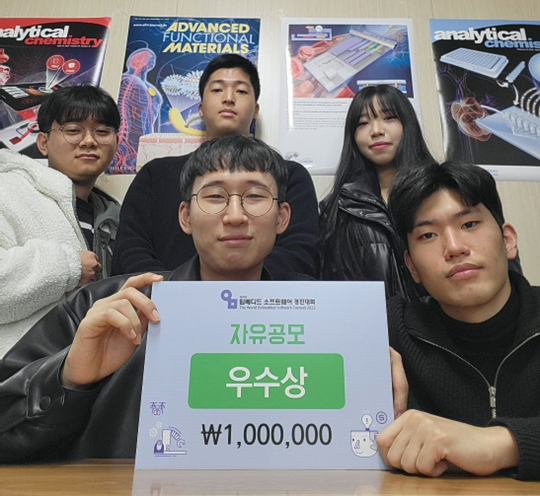Prof. Shim Joon-seop's Research Team Won The Excellence Award at 2022 Embedded SW Contest
- admin
- 2023-03-09
- 1384
Professor Shim Joon-seop (Department of Electronic Convergence Engineering) Research Team Won the Excellence Award at 2022 Embedded SW Contest
-Can Measure Up to 100 Times Lower Concentration Compared to
Existing Technology, Increasing the Accuracy of Inspection -

Students led by Professor Shim Joon-seop (Department of
Electronic Convergence Engineering) won the Excellence Award (Korea Evaluation
Institute of Industrial Technology Director's Award) at the 20th Embedded SW
Contest under the theme of 'Cloud AI based microfluidic control technology for
COVID-19 detection'.
The participating team BIOS consisted of Kim
Soon-jong, Lee Joon-hee, Cho Woo-hee, and Park Min-joon, who are undergraduates
of the Department of Electronic Convergence Engineering, and Lee Ju-won, a
guidance researcher (graduate student).
The submitted work is a cloud system that implements an
excellent real-time COVID-19 detection system with accuracy and convenience,
and an AI-based self-diagnosis system for coronavirus (COVID-19).
Self-diagnosis kits
currently in use have a problem in that accuracy is not high for early patients
or patients with low amounts of virus because they use paper-based
antigen-antibody reactions. o
solve this problem, the BIOS team led by Professor Joon-seop Shim
quantitatively detected the coronavirus (COVID-19) using the ELISA test method
used for precise blood tests. Through this, it was verified through experiments
that it can measure up to about 100 times lower concentration than the existing
technology.
Since the ELISA equipment used in the existing precision blood
test is very large and expensive, the accessibility of the general public was
low, and it could not be used as a real-time test equipment in the field. The research team
used AI to control and automate microfluids so that non-professionals could use
them. In addition, a
high-performance artificial intelligence program that automates diagnostic
programs can be applied to edge devices through cloud computing, so that
multiple diagnostic platforms can be controlled simultaneously. This could have
a cost advantage. In addition, the test results are transmitted to the database
of the web server so that the examinee can check the results of the coronavirus
(COVID-19) test in real time and grasp the current status of infection
nationwide.
Professor Shim
Jun-seop, who directed the research, said, “In order to strengthen quarantine
through the current COVID-19 test, it is necessary to quickly grasp the result
through an accurate test and monitor it in real time to block further
transmission. The portable ELISA analyzer developed in this study is a key
technology that can achieve these requirements.”
Meanwhile, this study was conducted as part of the KwangWoon IT eXhibition (KWIX) program of Kwangwoon University. Kwangwoon University KWIX is a program in which a team consisting of undergraduate students and advisors conducts a one-year R&D project to strengthen students' practical education.